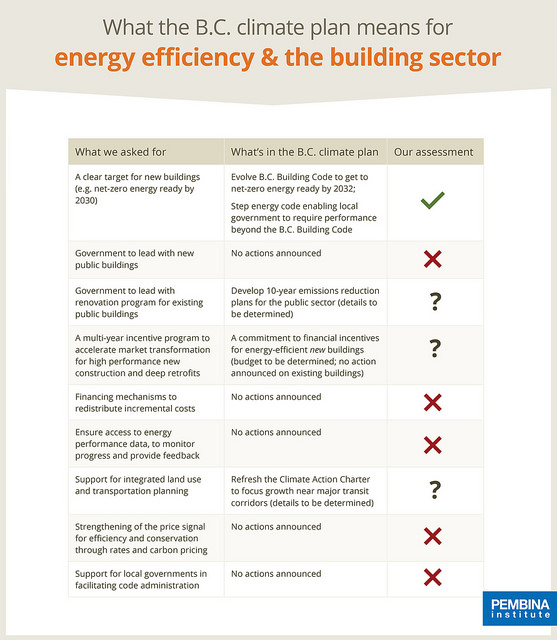The B.C. government’s long-awaited new climate plan does not put B.C. on track to meet its legislated climate targets for 2020 and 2050. However, it does include some promising commitments with respect to climate and energy in the building sector. The establishment of a net-zero energy ready code target for new buildings by 2032 and the development of an energy “step code” for local governments are positive steps toward a sustainable future for B.C.’s buildings.
This year, more than 100 companies, organizations and cities endorsed the Call for Action on Energy and Climate in the Building Sector, initiated by the Pembina Institute, Royal Architectural Institute of Canada and Urban Development Institute Pacific Region. “Together, we are ready to transition to a resilient and efficient building sector,” the signatories declared.
Here’s how the plan stacks up against our nine key requests in the Call for Action:

While there are many important gaps to be filled, the commitment to a net-zero energy ready target and to providing B.C. with the regulatory and financial means to meet this objective are significant. Net-zero energy ready buildings (designed to be so efficient that their annual energy demand could be offset by on-site renewable energy, such as solar panels) are an important and affordable step toward meeting B.C.’s climate targets if properly implemented.
There are many details in the climate plan that have yet to be clarified (as the above table notes), including what resources will be allocated to these objectives in the budget — for incentives, financing and government leadership, etc. As we called for, in the next six months we will need a clear roadmap outlining how the net-zero ready target will be met so that industry and training institutions can prepare. The roadmap should be flexible enough to allow developers to meet government net-zero targets using a number of equivalent approaches — low carbon district energy, on-site renewable energy, waste energy, etc. We also will need a strategy to address the many existing buildings in need of a deep energy retrofit — a significant economic opportunity that complements the new building sector.
In November, the Pembina Institute — in partnership with TD, the Real Estate Foundation of B.C. and industry partners including the Urban Development Institute — will convene more than 100 architects, developers, government officials, manufacturers, property managers and other leaders in the building sector to tackle pressing issues in implementing net-zero ready new buildings and addressing emissions from existing buildings. The Pathways to Net-Zero Buildings thought leader forum takes place November 28 and 29 in Vancouver.
We look forward to continuing to work with the B.C. government, federal partners and the construction industry to advance the remaining policy pieces and move towards implementation.
Anne McMullin is the president and CEO of the Urban Development Institute Pacific Region.
Jennifer Cutbill is the B.C.-Yukon regional director at the Royal Architectural Institute of Canada.
Karen Tam Wu is the director of the buildings and urban solutions program at the Pembina Institute, a non-profit think-tank that advocates for strong, effective policies to support Canada’s clean-energy transition.
Like this article? Please chip in to keep stories like these coming.




